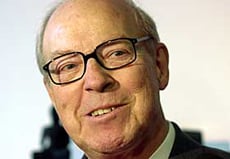
The Tyee.ca
Many see the reelection of George W. Bush as a doomsday scenario. But the man at the forefront of debate over the U.S. led invasion of Iraq remains cautiously optimistic that the world's lone superpower has learned a valuable lesson - however costly it may have been.
Hans Blix led the UN weapons inspection team into Iraq prior to the invasion in 2003. Although his team was pulled out prematurely, Blix maintained there were no weapons of mass destruction in Iraq. Without any evidence to the contrary, his claims remain true.
Blix is in Vancouver this week for the third meeting of the Weapons of Mass Destruction Commission, a 15 member UN initiative to assess the risk of biological, chemical, and nuclear weapons proliferation and to propose realistic solutions for global peace and security.
Blix consistently opposed the U.S. rationale for going to war. When the Bush administration disparaged him for his stance, Blix lashed back rather undiplomatically earlier this year, referring to some in Bush administration as 'bastards.' Blix later retracted his comments for their frankness.
Iraq war breeding terror
"President Bush said that the world was better off without Sadaam, and I would agree with that. But I don't think it's safer," Blix said in an interview with The Tyee. "On the contrary, if one of the aims of the invasion of Iraq was to put a stop sign to terrorism, that has singularly failed, because the Iraq affair has been breeding terrorists, not stopping them."
According the 2004 Amnesty International annual report, there are 154 armed groups operating in the world, up from 132 just two years ago.
More than one-third of those groups are Muslim extremist organizations and the war on terror is bolstering their numbers. Amnesty reports that "humiliation" at the hands of the Christian West is the primary cause for the increase.
The number of terrorist attacks since 9/11 has also jumped to more than 4,400 from 2,300 two years before the World Trade Centre attacks.
This runs contrary to Bush's claims that the world is safer place without Sadaam Hussein.
"I think the Americans expected the Iraqis to come out and dance in the streets. Many Iraqis, I'm sure, were relieved that Sadaam was gone. But at the same time they felt that this was a foreign invasion of their country and their feelings of nationalism are strong. They would like to be masters of their own country," Blix said.
'UN is not irrelevant'
Despite predictions from some quarters that a third world war will break out under Bush, Blix is cautiously optimistic about the next four years. Blix said in his speech at UBC earlier this week that with the end of the Cold War, the era of world wars is behind us.
He said the U.S. administration has learned the limits of its military capability and that its "disdain" for the UN and the Security Council is misplaced.
The number of U.S. soldiers who have died in Iraq is nearing 1,100, adding to the thousands of innocent Iraqis who have been killed.
Of those who were willing to follow the U.S. into Iraq, Hungary, Spain, Norway, New Zealand, Thailand, Singapore, Moldova, the Netherlands and Poland have all reduced or ended their contribution to the war.
"If they thought the Security Council was irrelevant they must have realized that the lack of support from the Security Council and the UN is not irrelevant."
Faulty diagnosis
In the past, wars were fought over territory and ideology and although many would say that this applies directly to the war in Iraq, Blix disagrees.
He maintains the conflict was over the best time and best way to tackle a possible case of proliferation of weapons of mass destruction. The basis of this conflict was the U.S.'s erroneous information, he said.
"If you are to carry out a successful operation, whether it is in medicine or it is foreign affairs, you have to have a correct diagnosis. This was a totally erroneous diagnosis."
Blix said in his speech that the world has become too financially interdependent for another world war to occur. The gradual global integration brought about by modern technology, economics, and information "is gluing us together and will push us towards peace."
This is what happened in Libya, which gave up its weapons program not for fear of the U.S. military might, but for the economic sanctions it imposed, Blix said.
Iran and North Korea are likely to behave based on similar rational calculations, Blix said.
The future controversies between the great powers are more likely to play out in the areas of trade and finance rather than in the battle fields, he said.
"There are lots of intelligent people in the (U.S.) administration. While no government admits its mistakes, if they are intelligent they see the mistakes they have committed and they learn from them," Blix told The Tyee.
Scott Deveau is on staff at The Tyee.
![]()















Tyee Commenting Guidelines
Comments that violate guidelines risk being deleted, and violations may result in a temporary or permanent user ban. Maintain the spirit of good conversation to stay in the discussion.
*Please note The Tyee is not a forum for spreading misinformation about COVID-19, denying its existence or minimizing its risk to public health.
Do:
Do not: